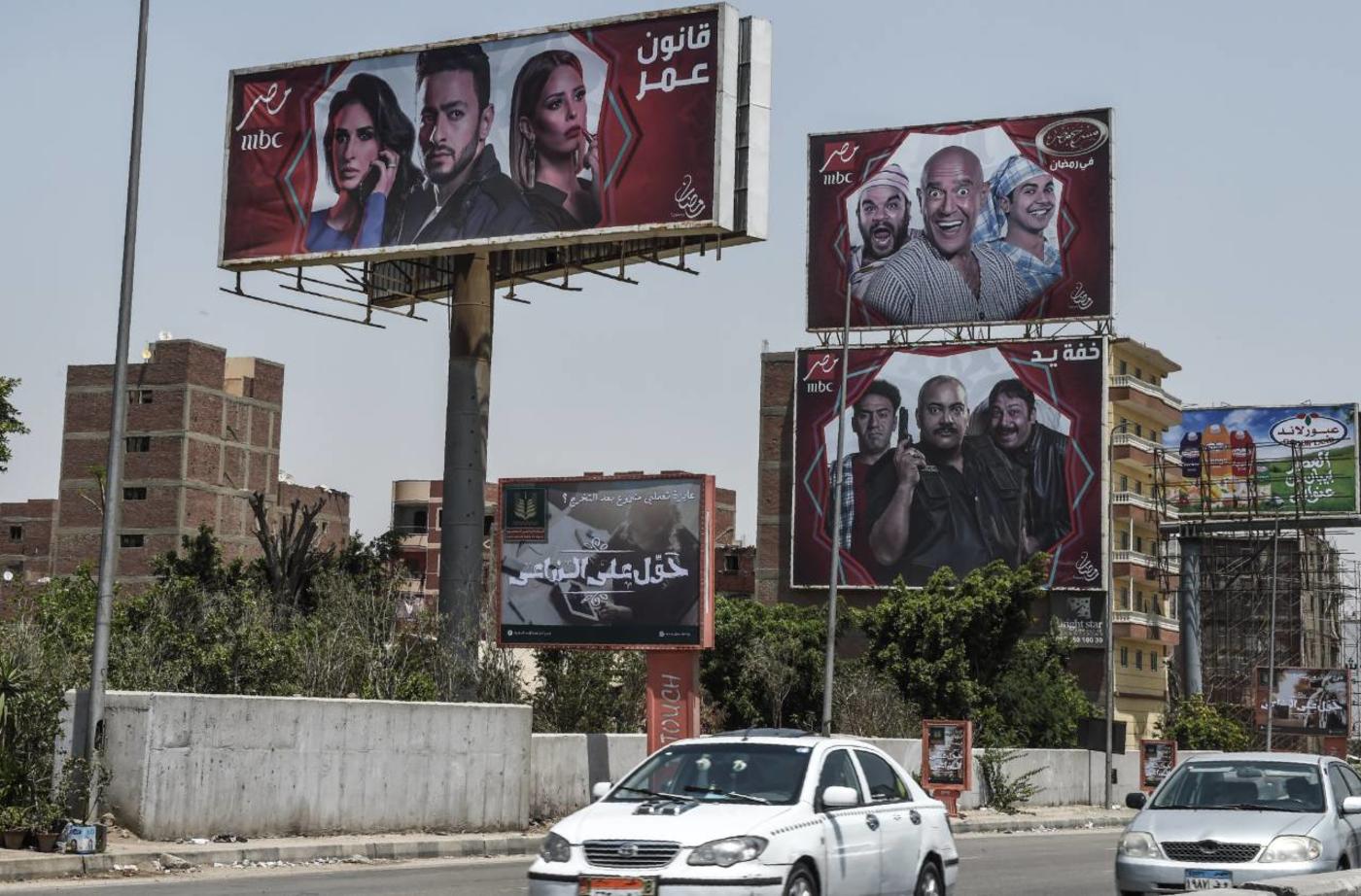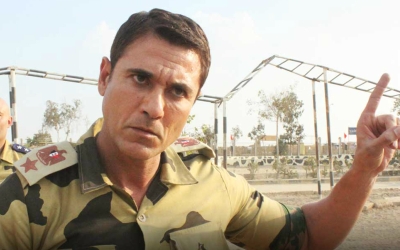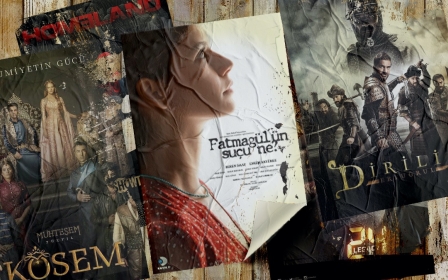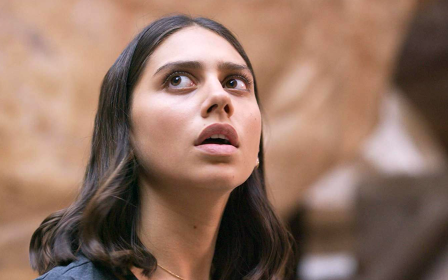Ramadan TV: The shows that beat the coronavirus lockdown
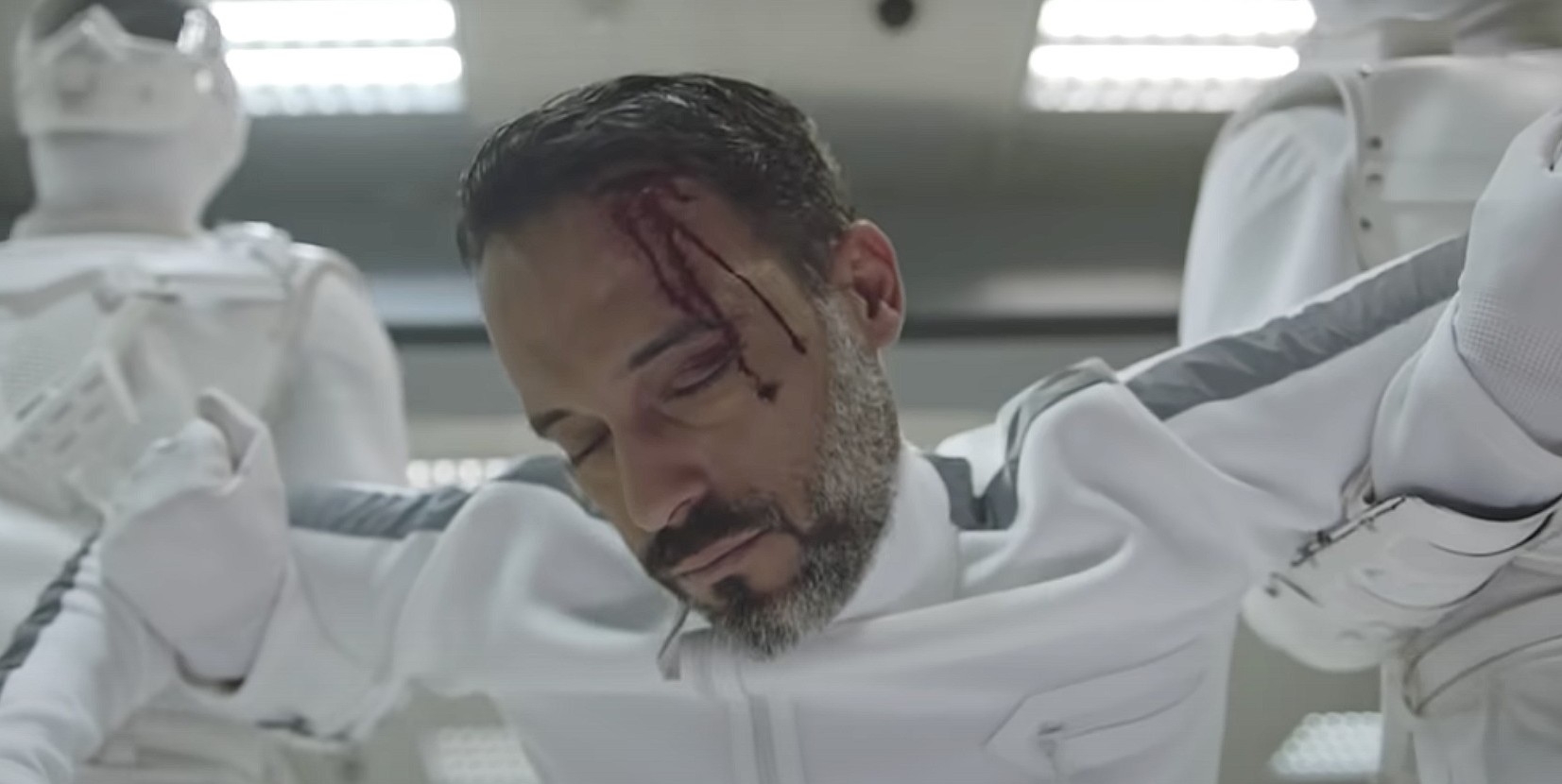
Ramadan is the biggest and most lucrative TV season of the year in the Arab world and the Middle East. Imagine something as all-encompassing as Super Bowl weekend, only it lasts for an entire month.
During the holy month, TV is the one thing that unites families from different socio-economic backgrounds. With most sources of entertainment suspended, the small screen has always been the main vehicle of leisure for millions of Arabs - and never has that been more true than now.
In March, doom and gloom presided over what would happen to Ramadan TV this year, as the coronavirus pandemic, which was first detected in Wuhan, China, spread across the world and reached every major Arab capital.
The MENA TV industry stared at an unprecedented catastrophe across the region, just as the demand for fresh content from locked-down audiences was beginning to soar. There were predictions that the 2020 season would be the smallest in nearly two decades. This is, after all, a business which, unlike its American and European counterparts, shoots and edits shows close to broadcasting. In the case of Ramadan, many shows continue shooting throughout the month.
Against all odds, most TV productions wrapped up in time for holy month
And yet, against all odds, most TV productions wrapped up in time for holy month, offering a sizeable slew of series by some of the biggest stars in the region. Their fate was primarily dependent on whether respective governments would grant TV producers leeway to continue shooting despite Covid-19 restrictions. In this they had official support: Arabic TV constitutes a substantial economic stream for governments, which often have a stake in broadcasters, if not owning them outright.
TV is also a great source of distraction to keep the increasingly restless masses at home. It was no surprise then when governments allowed producers to complete their productions, inciting the wrath of groups already angered at the closure of religious institutions.
Copious precautions against the spread of the coronavirus were taken on the set of productions, including deep cleans and medical staff on standby. Scenes involving crowds or sets abroad were axed, while shoots used second or third units to split the workload and reduce congestion. It worked: at the time of writing, only five or six Ramadan-bound shows - mostly those which started shooting later and needed overseas work - failed to make it to the screen in time. Has Ramadan TV become the first part of the entertainment industry to weather the coronavirus storm?
The TV revolution
The Arab world has a robust TV industry. In recent years, the mushrooming of satellite TV channels has meant more licensing fees for producers of content and more advertising revenue. Even economic crises and political upheavals - most notably during 2011 - have failed to derail its evolution. Inter-regional competition and the popularity of US imports TV have pushed the industry to up its game.
The most advanced and biggest industry is traditionally that of Egypt, the region’s most populous nation. It dominated its position as the biggest force in MENA TV until the beginning of the new century when the likes of Syria and Lebanon began to challenge its hegemony.
In Syria, programme-makers began to reimagine long-form storytelling by making their dramas - such as the historical dramas Bab al-Hara, Nizar Qabbani and Al Bawasel - more concise and adopting new aesthetics rooted in cinema.
Egypt began the biggest TV evolution in the region, upping production values and attracting marquee film stars
Egypt took note and began the biggest TV evolution in the region, upping production values, attracting marquee film stars and embracing a more stylistic approach that eliminated the stodgy, dull-looking Egyptian series they were notoriously known for. With every passing decade, more series - of different production sizes and genres - were made, as advertising money continued to pour in.
Lebanon, meanwhile, followed the Turkish model, drawing a niche audience of mostly middle-aged housewives, attracted by sweeping, fanciful romantic yarns that stuck closely to the soap opera formula.
Thematically, Arab TV series usually focus on the social, documenting for the past 70 years the various transformations of Arab society, from shifts in family dynamics and the rise of political forces to the impact of capitalism, technology and corruption.
Content rarely ventures into the holy trinity of taboo subjects - sex, politics and religion – although a brief window of freedom opened in Egypt between 2010 and 2015 before the government began to seize control of the industry.
Egypt: Can indies beat Synergy?
For this Ramadan, Arab TV appears to be back on track, with 50-plus premieres contributing to one of the most diverse lineups in recent years.
Leading the pack is Egypt after a lacklustre 2019, its weakest year for a decade. Much of this has been due to the consolidation of the entertainment industry by the government: for the past three years, scripts have been heavily censored to prevent any criticism of the authorities or moral flippancy common during the previous decade.
Synergy, the mega entertainment conglomerate with ties to military intelligence, remains the leading force behind this year’s most anticipated shows. In 2019 it drove its competitors out of the market, taking control of TV stations and buying advertising agencies, thereby owning the full production cycle.
This year, at least, other production houses have been allowed to operate. The result is a far more exciting line-up.
The single most intriguing production of the season, El Nehaya (The End, trailer below, premieres on On, On Drama, Al Hayat, DMC) stars Ahmed El Sherif in the region’s first full-fledged sci-fi series. Set in 2120 in an unidentified dystopian wasteland, El Sherif plays a computer engineer attempting to navigate his way through a ruinous world governed by technology while confronting his biggest threat - a cyborg clone. During the past decade, El Sherif has proved to be the most ambitious and adventurous TV star in MENA, heading diverse projects including crime sagas, thrillers and horror. The End should continue this streak and, if successful, could potentially become a stepping stone in the development of Egyptian TV drama.
Far lighter in tone, if no less exciting, B100 Wesh (With 100 Faces, premieres on Dubai, Hayat, Hayat Drama, OSN) stars the unlikely pair of Nelly Karim and Asser Yassin in their first comedy for TV. Acclaimed director Kamla Abu Zikri (Zat, Sunset Oasis) directs this caper comedy about two con artists from opposite sides of the class spectrum who fall in love. All three talents have strong track records. The comedic change direction could result in a wholly unpredictable endeavour.
Broader in comic tone is Regalet el-Beet (Men of the House, premieres on Abu Dhabi, ON, DMC, CBC), the second collaboration between comedy stars Ahmed Fahmy and Akram Hosni after their hugely successful 2017 sitcom Rayah el Madam (Appease the Missus). Fhamy and Hosni are Timon and Pumbaa, two man-child brothers who must learn to take responsibility when they move to their grandfather’s apartment and try to save it from the building's owner who wants to convert it. The chemistry of the star pair always elevates their material, and Regalet el-Beet should be no exception. Ahmed El Guindy (Teera Enta, El Kbeer) directs.
Actress Dina El Sherbiny established herself as a bona fide star with last year’s murder mystery Zay el Shams (Like the Sun), one of the few popular series of the otherwise destitute 2019 season. El Sherbiny follows the same route in Le’bet el Nesyan (The Forgetting Game, premieres on MBC Masr), another suspense thriller about a woman who wakes to find herself six years older, confronting a new life to which she struggles to adapt. Helmed by celebrated writer/director duo Tamer Habib and Hany Khalifa of Sleepless Nights fame, The Forgetting Game should be a step up for the young rising star.
Several veteran performers, including Yosra and Nadia El Gendy, whose serials were delayed last year, return in 2020 with productions shrouded in scepticism. Foremost of the bunch is Adel Imam, the region’s biggest - and highest-paid – comedy star. Valentino (premieres on DMC, DMC Drama, MBC, MBC Iraq, Jordan, OSN) is a satire about an owner of an international school chain who ventures to save his business, and consequently his marriage when an unexpected crisis hits him. Co-starring Dala Abdel-Aziz and Dalia El-Behery, Valentino could be the long-awaited return to form which Imam’s fans have been anticipating (although the 79-year-old has yet to deliver anything of value since his return to the small screen in 2012).
Popular and controversial star Mohamed Ramadan presents yet another derivative piece of working-class action melodrama in El Brens (premieres on OSN, DMC Drama), a revenge story about a metalworker who gets betrayed by his siblings after the death of their father. Directed by Mohamed Samy, director of last year’s Breaking Bad rip-off, Weld El Ghalaba, El Brens unabashedly caters to the lowest common dominator. Don’t expect sophisticated plotting or subtle characterisation.
Since President Abdel Fattah el-Sisi's ascension to power, a breed of gung-ho nationalistic actioners, celebrating the heroics of the army and the police, have emerged in Egypt. Now a staple fixture in every TV season, Ramadan 2020 has no shortage of these brisk propaganda pieces. The most high-profile of the lot is El Ekhteyar (The Choice, premieres on E, On Drama and MBC Drama), the biopic of army officer Ahmed Saber el-Mansy, who was murdered in a 2017 Islamic State group attack in Rafah. Directed by Peter Mimi and starring Amir Karara, The Choice marks the fourth consecutive director/star pairing following the Kalabsh (Handcuffs) trilogy, a popular series that essentially functioned as a glossy facelift for the Egyptian police.
Lebanon: Productions hit
Lebanon has fared less well than Egypt in the post-coronavirus TV world. Its two most high-profile productions for 2020 – the romance Dauntil (Lace), and the ensemble period piece The Beirut Class– failed to make it to the screen due to the pandemic lockdown among other reasons. But a number of other series did manage to make the cut.
A social drama chronicling the tumultuous relationship between a judge and a media personality, Awlad Adam (Sons of Adam, premieres on LBC and MBC 4) stars Magay Bou Ghosn and Maxim Khalil. Its Syrian director, Allaith Hajjo, rose to fame thanks to a series of well-liked romantic dramas including 24 Karats and Game of Death. Adam is unlikely to break new ground, but will at least offer more of the same for fans of emotive Lebanese dramas.
More ambitious is El Nahat (The Sculptor, premieres on OSN and Abu Dhabi), a thriller about a sculpture student who returns home to solve the enigma behind his father’s murder. It is directed by Tunisian Majdy Al-Semery and stars Syrian thespian Bassel El Khayat and Algerian singer Amel Abouchoucha.
Kuwait: Trying to catch up
This Ramadan, Kuwait offers one of its strongest lineups to date. That said, its programming is still behind Egypt, with a style that veers more towards that of soap operas, with staid visuals and storylines that lack any crispness.
Headlining this year’s bill is Om Haroun (premieres on MBC), a daring account of the Jewish merchant communities that resided in Kuwait during the 1930s. The show has already generated plenty of controversy and some critics regard it as an invitation to normalise relations with Israel. It is directed by the Egyptian Ahmed Gamal El-Adl and stars revered Gulf actor Hayat El-Fahd.
Vying to steal the limelight from Haroun is Haya w Banatha (Her and Her Daughters, premieres on MBC) another social drama, set between the 1970s and the present, about generational disjunction among a group of women. It is directed by Khaled Rady Al Fadly and stars Basima Hamada, Ahlam Hassan, and Hind al-Balushi.
More frivolous is Mannequin (Premieres on Abu Dhabi), a romantic comedy about three generations of women from a family notorious for its bad luck with men. The women try to turn the tide when they open a coffee shop run by a group of potential suitors. Mannequin is directed by Haya Abdulsalam, who co-stars alongside Asmahan Tawfiq and Heba El Dorry.
Saudi Arabia: Satire and anthology
TV in the kingdom, like Kuwait, still lags behind the main regional players. A trio of shows, however, may be worthy of attention. The most high-profile show this holy month in the kingdom, Makhraj 7 (Exit 7, premieres on MBC) is a satire documenting the impact of recent modernising reforms on Saudi society. It's directed by Ous El Sharky and stars Nasser al-Qasaby, the Gulf’s pre-eminent comedy star.
And Jordan/Palestinian star Eyad Nassar makes his comeback with El Khawaby. This collection of stories, set during the 1920s and exploring the different facets of Palestinian identity, is directed by Mohamed Elwan.
Middle East Eye propose une couverture et une analyse indépendantes et incomparables du Moyen-Orient, de l’Afrique du Nord et d’autres régions du monde. Pour en savoir plus sur la reprise de ce contenu et les frais qui s’appliquent, veuillez remplir ce formulaire [en anglais]. Pour en savoir plus sur MEE, cliquez ici [en anglais].


